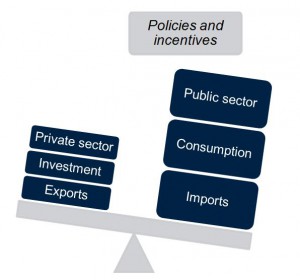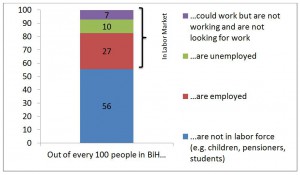27th November 2015
Growth, jobs and fairness: The Reform Agenda
Wherever I go in Bosnia and Herzegovina, I try to seek out ordinary citizens, particularly young people, and to talk to them about the new EU strategy, and the Reform Agenda that has come from it. From all these conversations, one thing is very clear: most people really don’t understand what the Reform Agenda is all about.
That’s not their fault. There’s not enough detailed information available to the public. Those of us who want to see the Reform Agenda succeed have to work a lot harder to explain what it means, and why it’s worth supporting.
First and foremost, that’s the job of politicians. One important difference from previous initiatives is that this time the international community is not setting the agenda. The priorities in the Reform Agenda are those of the State and Entity-level Governments. Our role has been to advise and to support, not to dictate. But we think that they are the right priorities.
Why? Well, to illustrate some of the challenges facing your governments, here are a few statistics, drawn from recent analysis by the World Bank, EBRD and the IMF, amongst others:
- BiH’s economy is expected to grow by up to 2.8% this year, but this is from a low base and it’s just too slow. The economy is weighed down by a huge public sector that already consumes nearly 50% of GDP just to sustain itself, and which is growing in both size and cost, with wages increasing much faster than in the private sector.
- Youth unemployment of over 60% means that a huge amount of human potential is being wasted, and too many talented people are leaving to find opportunities elsewhere that they are denied at home – by one estimate, 68,000 last year. The overall population is shrinking except for the number of pensioners, which is growing.
- BiH remains a really difficult country in which to do business, with the most rigid labour regulations in the region, and some of the worst scores in the world for ease of starting a new business, getting construction permits and utilities, and paying taxes. This is why you import much more than you export.
- Taxes in BiH are amongst the highest in Europe, but public services are often well below European standards. At 15.5% of GDP, social security contributions are the highest in South East Europe, but much too little goes to the poorest members of society, while a full 17% of the welfare budget goes to the wealthiest 20% of the population.
- According to a 2014 poll by Gallup, 91% of people in BiH believe that corruption in government is widespread – the second worst score in the world.
All of this means that the political and social economy of this country is unbalanced, and unsustainable. The only way to tackle these problems is through a serious and sustained programme of reforms. This is already happening elsewhere in the region, and around the world. BiH has left it very late. In a competitive and fast-moving global economy, there is no more time to lose.
Let’s look at the reforms a bit more closely, to see how they will try to address some of these economic and social challenges. For me, there are three key themes that run throughout the Reform Agenda: growth; jobs; and fairness.
- Growth. You also need to invest more in areas that can create real value – like energy, transport and infrastructure. Taxes on jobs are already too high, so the money will have to come from elsewhere. The reforms include measures to reduce the huge cost of the public sector, through public administration reform, and through the privatisation, restructuring or insolvency of loss-making, state-owned companies that are a drain on the economy. By reforming and simplifying the tax system, and introducing a more robust system of inspections and penalties, governments will seek to tackle the grey economy, and to increase revenues. And expect increases to excise duties on consumption, like fuel or alcohol, in order to pay for improvements to roads and the health sector.
- Jobs. BiH needs jobs. And sustainable, new jobs can only come from the private sector. That means that BiH has to turn itself into an attractive home for domestic and foreign investors. The Reform Agenda puts a high priority on reforms to improve the business climate – cutting red tape, lowering taxes and para-fiscal fees, strengthening the security of contracts and accelerating the resolution of commercial disputes. New labour laws will make it easier for companies to react more flexibly to changes in the market, and should encourage them to employ more people when times are good. And there should also be measures to make it easier, and cheaper, for companies to recruit young people who are entering the workforce the first time.
- Fairness. The reforms include specific measures to tackle corruption and to strengthen the independence and efficiency of the justice system. Simplified procedures for business registration and taxation, including more use of e-Services, will reduce the opportunities for corruption. The social welfare system will also be reviewed, so that more money goes to those who most need it. 7% of the population could work but are not even looking for employment. Expect changes to increase the incentives for them to become productive members of society.
There’s no doubt that these reforms won’t all be easy, or pain-free. Sometimes surgery is needed to heal the body. But there is also a very positive story which has not been told enough. It can be summed up in a single word: modernisation.
The Reform Agenda is about putting this country on a more stable economic footing. It’s about opening up jobs and opportunities to the many, not just the privileged few. It’s about tackling the inequalities and injustice within society. These are the issues which matter most to most people in this country. That’s why the EU decided to focus on them in the first place.
So I hope that people will get behind these reforms. Politicians need to hear the voices of those who stand to gain from modernisation – young people, entrepreneurs and businesses, the poor and unemployed – at least as loudly as the voices of those who benefit from the outdated and unfair status quo.

